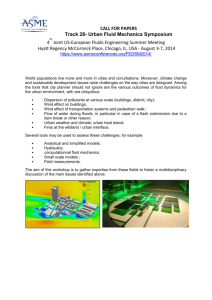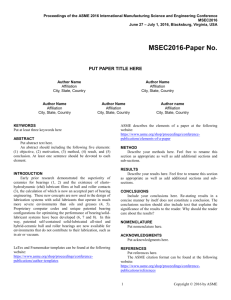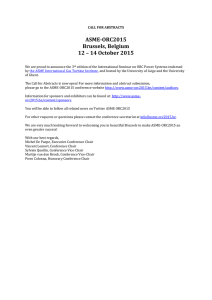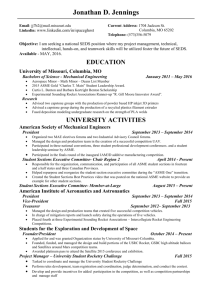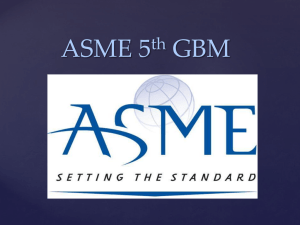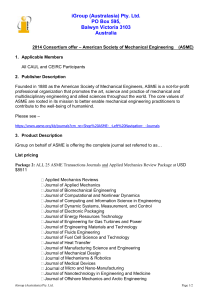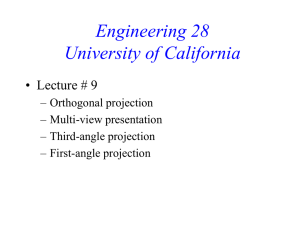An Overview of ASME Y14.41 – 2003
advertisement
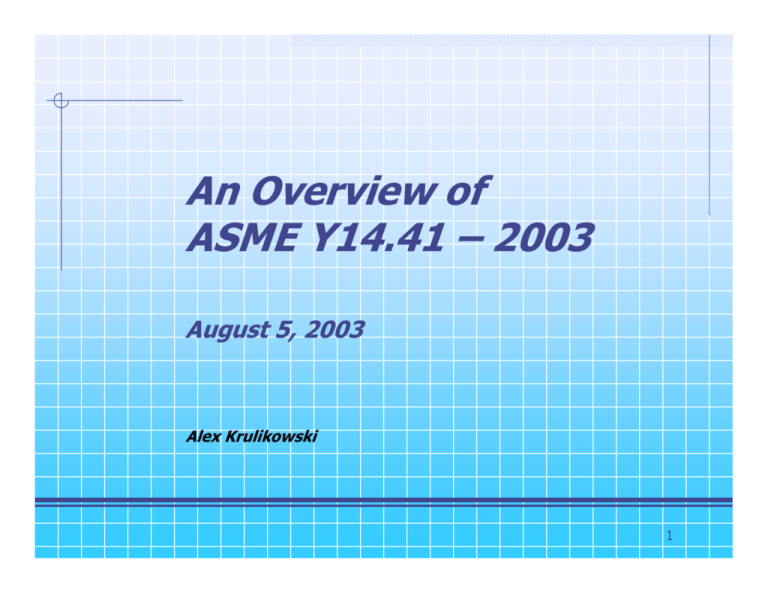
An Overview of ASME Y14.41 – 2003 August 5, 2003 Alex Krulikowski 1 Introduction Alex Krulikowski • Manager of Standards and GD&T COE • Embedded GD&T implementation project at GM Powertrain • Chair of ASME Y14.41 Digital Product Definition Data Practices • Member of ASME Y14.5 Dimensioning and Tolerancing • Member of ASME Y14 Main • Author of 12 books on GD&T and Tolerance Analysis 2 Agenda Today’s discussion includes • Why a new standard was needed. • The challenge of creating the standard quickly • An overview of the standard This presentation can be obtained from www.etinews.com • Benefits of the standard • Closing comments 3 The Need for a New Standard • The model is “nominal” only From ASME Y14.41 - 2003 4 The Need for a New Standard • The model is “nominal” only • Current standards did not include tolerancing of models From ASME Y14.41 - 2003 5 The Need for a New Standard • The model is “nominal” only • Current standards did not include tolerancing of models • Current standards did not include tolerancing of axonometric views From ASME Y14.41 - 2003 6 The Need for a New Standard • The model is “nominal” only • Current standards did not include tolerancing of models • Current standards did not include tolerancing of axonometric views • Reduced dimension drawings were becoming more common without any standard to support the practices. From ASME Y14.41 - 2003 7 ASME Y14.41 Committee Formed • ASME Y14.41 sub-committee formed in 1998 8 ASME Y14.41 Committee Formed • ASME Y14.41 sub-committee formed in 1998 • 16 companies represented Boeing Company Caterpillar Inc CNH Global NV Department of the Army Dassault Systems EDS PLM Solutions Ford Motor Co. General Dynamics Land Systems General Motors Lockheed Martin Aeronautics Raytheon Rockwell Collins Rolls-Royce Corp SDRC Seimens Power Generation Thiokol Propulsion 9 ASME Y14.41 Committee Formed • ASME Y14.41 sub-committee formed in 1998 • 16 companies represented Committee formed 0 Publication Typical standard 10 • Accelerated Development 1998 Y14.41 2003 10 ASME Y14.41 Standard • Title of new standard DIGITAL PRODUCT DEFINITION DATA PRACTICES ASME Y14.41-2003 11 ASME Y14.41 Standard • Title of new standard • Standardizing new practices 12 ASME Y14.41 Standard • Title of new standard • Standardizing new practices • Scope • Establishes requirements and reference documents applicable to the creation of product definition data sets. • Defines exceptions and additional requirements to existing ASME standards for using product definition data sets or drawings in digital format 13 ASME Y14.41 Standard • Title for new standard • Standardizing new practices • Scope • Structure of the standard • Product definition data set • Model only • Model plus drawing in digital format From ASME Y14.41 - 2003 14 ASME Y14.41 Standard Contents 1 - General 2 – Data set Identification and control 3 – Data set requirements 4 – Model Requirements 5 – Common requirements for product definition data 6 – Notes and Special Notations 7 – Model Values and Dimensions 8 – Plus and Minus Tolerances 9 – Datum Applications 10- Geometric Tolerances 15 ASME Y14.41 Standard Contents 1 - General 30 Definitions 2 – Data set Identification and control • • • • • • • • • • • • • 3 – Data set requirements 4 – Model Requirements 5 – Common requirements for product definition data 6 – Notes and Special Notations 7 – Model Values and Dimensions 8 – Plus and Minus Tolerances 9 – Datum Applications 10- Geometric Tolerances • • Annotation Annotation plane Assembly model Associated entities Associated group Associativity Attribute Data Datum system Derivative Design model Digital element Digital element identifier Direction dependent tolerance Geometric element • Hard copy • Installation model • Management Data • Model • Model coordinate system • Model geometry • Model value • Product definition data set • Query • Represented line element • Resolved dimension • Saved view • Supplemental geometry 16 ASME Y14.41 Standard Contents 1 - General 2 – Data set Identification and control 3 – Data set requirements 4 – Model Requirements 5 – Common requirements for product definition data Rules and guidelines • Data set identifier • Drawing Identification • Related data • Data management 6 – Notes and Special Notations • Approval 7 – Model Values and Dimensions • Revision history 8 – Plus and Minus Tolerances 9 – Datum Applications 10- Geometric Tolerances 17 ASME Y14.41 Standard Contents 1 - General 2 – Data set Identification and control 3 – Data set requirements 4 – Model Requirements 5 – Common requirements for product definition data 6 – Notes and Special Notations 7 – Model Values and Dimensions 8 – Plus and Minus Tolerances 9 – Datum Applications 10- Geometric Tolerances Requirements, guidelines, options • Fundamental dimensioning & tolerancing requirements • General model requirements • Associativity • Model coordinate systems • Application of supplemental geometry • Part features not fully modeled • Model views • Saved views • Section views Example 18 ASME Y14.41 Standard Contents 1 - General 2 – Data set Identification and control 3 – Data set requirements 4 – Model Requirements 5 – Common requirements for product definition data 6 – Notes and Special Notations 7 – Model Values and Dimensions 8 – Plus and Minus Tolerances 9 – Datum Applications Model Requirements • Geometric Scale, Units and Precision • • • Scale Units Precision 1:1 Must be specified in data set Must be specified in data set • Model completeness • Partial model (i.e. threads not modeled) • Must be specified in data set • Assembly Model • May be exploded, partially assembled, or completely assembled state. • Only requires enough detail to ensure correct identification, orientation, and placement of parts. 10- Geometric Tolerances 19 ASME Y14.41 Standard Contents 1 - General 2 – Data set Identification and control 3 – Data set requirements 4 – Model Requirements 5 – Common requirements for product definition data • Common requirements • Ability to enable or disable the display of annotation • Hard copy available upon demand • Model requirements • Associativity 6 – Notes and Special Notations • Attributes available upon demand 7 – Model Values and Dimensions • Annotation planes • Leader lines 8 – Plus and Minus Tolerances 9 – Datum Applications 10- Geometric Tolerances 20 ASME Y14.41 Standard Contents 1 - General • Requirements 2 – Data set Identification and control • All notes must be in a single annotation plane 3 – Data set requirements • General notes do not require association 4 – Model Requirements 5 – Common requirements for product definition data • Flag notes require association 6 – Notes and Special Notations 7 – Model Values and Dimensions 8 – Plus and Minus Tolerances 9 – Datum Applications 10- Geometric Tolerances 21 ASME Y14.41 Standard Contents 1 - General 2 – Data set Identification and control 3 – Data set requirements 4 – Model Requirements 5 – Common requirements for product definition data 6 – Notes and Special Notations 7 – Model Values and Dimensions 8 – Plus and Minus Tolerances 9 – Datum Applications 10- Geometric Tolerances • Resolved dimensions • Rounded to the number of places required for the design • Applies to all dimensions obtained from the model. Example • Basic Dimensions • Queried model values shall be interpreted as basic dimensions unless superceded by a toleranced dimension or defined as a reference dimension. • If basic dimensions are displayed, they shall be in accordance with Y14.5. Example • Size dimensions • Bilateral or unilateral tolerance – The displayed size dimension must agree with the queried model value. • Limit Dimensions – The resolved model value may equal one of the limit dimensions, or be any value within the displayed range of limits Example 22 ASME Y14.41 Standard Contents 1 - General 2 – Data set Identification and control 3 – Data set requirements 4 – Model Requirements 5 – Common requirements for product definition data 6 – Notes and Special Notations • Limits the use of plus/minus dimensions to the following: • Fillets, rounds, chamfers • Reliefs, step surfaces • Countersinks • Oblique surfaces • Entry depth and spotface • Notches, flats and pin heights Example 7 – Model Values and Dimensions 8 – Plus and Minus Tolerances 9 – Datum Applications 10- Geometric Tolerances 23 ASME Y14.41 Standard Contents 1 - General • Establishes Requirements for: 2 – Data set Identification and control • Datum reference frame and model coordinate system correspondence 3 – Data set requirements • Datum reference frame and model coordinate system associativity 4 – Model Requirements • Multiple Datum reference frame and model coordinate system relationship 5 – Common requirements for product definition data 6 – Notes and Special Notations 7 – Model Values and Dimensions 8 – Plus and Minus Tolerances Example • Shows attachment methods for identification of datum features and datum targets Example 9 – Datum Applications 10- Geometric Tolerances 24 ASME Y14.41 Standard Contents 1 - General 2 – Data set Identification and control • Establishes Requirements for: • Attachment methods for geometric tolerances • Display in axonometric views 3 – Data set requirements 4 – Model Requirements 5 – Common requirements for product definition data 6 – Notes and Special Notations 7 – Model Values and Dimensions 8 – Plus and Minus Tolerances • Establishes exception / expansions of Y14.5 • New symbol for unilateral profile • New method for denoting view dependent controls • Uses symbol from Y14.8 (castings) for movable datum targets Example 9 – Datum Applications 10- Geometric Tolerances 25 ASME Y14.41 Standard Benefits The new standard provides several benefits to industry. • Standardize communications relative to digital data (30 new terms defined ) • Provides guidance on how to display tolerances on models and axonometric views • Introduces the concept of a product definition data set • Provide guidance to software manufacturers • Methods for creating and using digital data are being addressed 26 Closing Comments The first version of new standard leaves several challenges to be addressed. • Currently the standard is more of a collection of practices or a toolbox of math based practices in industry. 27 Closing Comments The first version of new standard leaves several challenges to be addressed. • The current focus is the display of annotation. 28 Closing Comments The first version of new standard leaves several challenges to be addressed. • Future versions need to address the transistion between engineering specifications, the electronic model, and part inspection. 29 Closing Comments The first version of new standard leaves several challenges to be addressed. • There are gaps in ASME standards that need to be filled to support math processes (i.e. tolerances not mathematically sound, vague requirements, view dependent tolerances etc) 30 Closing Comments The first version of new standard leaves several challenges to be addressed. The Y14.41 standard is just one tool of the set needed for industry to become math based. Connectivity Standards Viewers Hardware Software Translators 31 Closing Comments Cu ltu r e The first version of new standard leaves several challenges to be addressed. The Y14.41 standard is just one tool of the set needed for industry to become math based. Connectivity Standards Viewers Hardware Software Translators The culture of the users is a key to implementing a math based process in industry 32 Closing Comments Cu ltu r The first version of new standard leaves several challenges to be addressed. e Connectivity The Y14.41 standard is just one tool of the set needed for industry Standards to become math based. The culture of the users is a key to implementing a math based process in industry. Viewers Software Hardware Translators To make the math based process a reality in industry, it will take many tools coming together and working in harmony 33 How to purchase a copy of the Y14.41 Standard http://www.asme.org/codes/pr/y1441.html#description 34 Digital Tolerancing Forum http://www.etinews.com 35 The End 36 From ASME Y14.41 - 2003 Return 37 From ASME Y14.41 - 2003 Return 38 From ASME Y14.41 - 2003 Return 39 From ASME Y14.41 - 2003 Return 40 From ASME Y14.41 - 2003 Return 41 From ASME Y14.41 - 2003 Return 42 From ASME Y14.41 - 2003 Return 43 From ASME Y14.41 - 2003 Return 44 From ASME Y14.41 - 2003 Return 45
